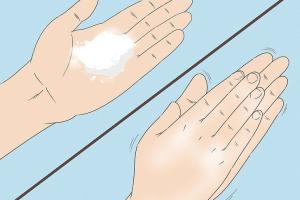Effective Methods to Remove Spray Foam from Your Hands

-
Quick Links:
- Introduction
- Understanding Spray Foam
- Health Risks of Spray Foam
- Why Removal is Necessary
- Prevention Tips
- Removal Methods
- Immediate Removal
- Using Soaps and Cleaners
- Natural Remedies
- Solvents and Chemicals
- Aftercare for Your Skin
- Case Studies
- Expert Insights
- Conclusion
- FAQs
Introduction
Spray foam insulation is a popular choice for homeowners and contractors due to its excellent insulating properties. However, it can be a messy substance, and accidentally getting it on your hands is a common issue. In this comprehensive guide, we will explore effective methods to remove spray foam from your hands, along with tips for prevention and aftercare.
Understanding Spray Foam
Spray foam is a two-component system made of isocyanate and polyol resin that, when mixed, expands and forms a solid foam. It is widely used in construction for insulation, air sealing, and weatherproofing. Its sticky nature makes it a challenge to clean off skin and surfaces.
Health Risks of Spray Foam
While spray foam is safe when applied correctly, skin contact can lead to irritation, allergic reactions, or dermatitis. It is crucial to handle spray foam with care and use protective gear to minimize these risks.
Why Removal is Necessary
Getting spray foam on your skin can cause discomfort and potential health issues. Additionally, the longer it stays on your skin, the harder it becomes to remove. This section will discuss the importance of timely removal and the consequences of neglecting this task.
Prevention Tips
Preventing spray foam from getting on your hands can save you a lot of trouble. Here are some effective prevention tips:
- Always wear gloves when working with spray foam.
- Use protective clothing to cover exposed skin.
- Keep the working area clean and organized to avoid spills.
- Use the right spray foam application techniques to minimize overspray.
Removal Methods
Immediate Removal
If you realize that you've gotten spray foam on your hands right after application, immediate removal is essential. Here are the steps to follow:
- Use a paper towel to wipe off as much foam as possible.
- Wash your hands with warm water and soap immediately.
Using Soaps and Cleaners
For more stubborn foam, specific soaps and cleaners can be effective:
- Hand Soap: Regular liquid hand soap can be effective if used immediately.
- Dish Soap: Mix dish soap with warm water for a more potent cleaning solution.
Natural Remedies
If you prefer using natural products, here are some remedies that can help:
- Olive Oil: Apply olive oil to the affected area to loosen the foam, then wash with soap.
- Coconut Oil: Similar to olive oil, it can help break down the foam.
Solvents and Chemicals
When all else fails, specific solvents can be used, but caution is necessary:
- Acetone: Can effectively remove spray foam but may irritate the skin.
- Mineral Spirits: A gentler alternative that can help dissolve the foam.
Aftercare for Your Skin
After successfully removing spray foam, it's essential to care for your skin to avoid irritation:
- Moisturize your hands with a good lotion.
- Avoid hot water for a few hours as it can aggravate the skin.
Case Studies
To illustrate the effectiveness of different removal methods, we consulted with various contractors who frequently work with spray foam. Here are some insights:
- Contractor A had success using a combination of immediate soap removal and olive oil.
- Contractor B found that using acetone was effective but required careful aftercare.
Expert Insights
We also reached out to dermatologists and safety experts to gather their views on the best practices for handling and removing spray foam:
"Always prioritize skin protection while working with spray foam. If contact occurs, act quickly to minimize irritation." - Dr. Jane Smith, Dermatologist
Conclusion
Removing spray foam from your hands doesn't have to be a daunting task. By understanding the methods available and taking preventative measures, you can effectively manage any mishaps that occur during your DIY projects. Always remember to prioritize safety and skin health!
FAQs
1. What should I do if spray foam gets on my skin?
Act quickly to remove it with soap and water, and consider using oils or solvents if necessary.
2. Can I use nail polish remover to remove spray foam?
Nail polish remover contains acetone, which can help dissolve spray foam. Use it with caution and moisturize afterward.
3. Is it safe to use chemicals on my skin?
Some chemicals can irritate the skin. Always perform a patch test and follow up with skin care after use.
4. How can I prevent spray foam from getting on my hands?
Wearing gloves and protective clothing can significantly reduce the risk of spray foam contact.
5. What is the best natural remedy for removing spray foam?
Olive oil is an effective natural remedy to loosen spray foam from the skin.
6. How long does it take for spray foam to dry on skin?
Spray foam can begin to cure within minutes, making immediate removal essential.
7. Can I use vinegar to remove spray foam?
Vinegar may help break down some substances but is generally less effective than oils or solvents.
8. What aftercare should I follow after removing spray foam?
Moisturize your hands and avoid hot water to prevent irritation.
9. Is there a spray foam removal product available in stores?
Yes, there are specialized spray foam removal products available that can be effective.
10. What should I do if I have a skin reaction to spray foam?
Seek medical advice if you experience any severe reactions or persistent irritation.